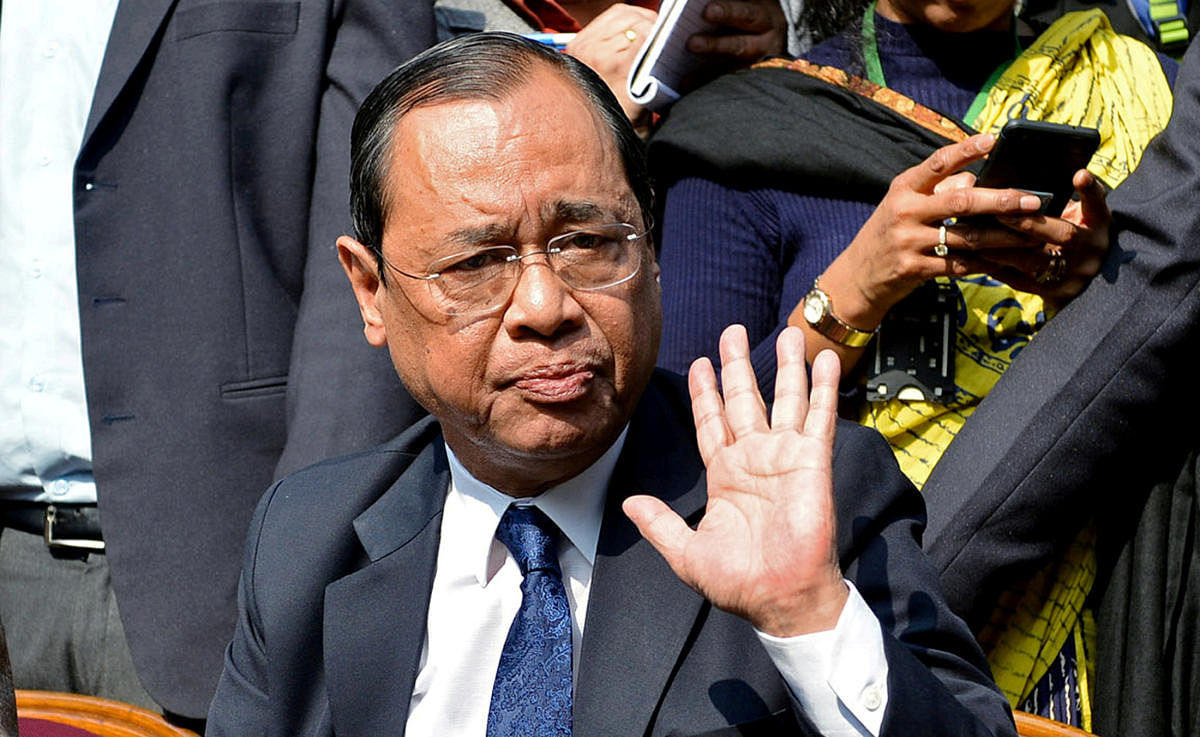“It would doubtless delight the hearts of a Gilbert and Sullivan Comic Opera audience but will hardly inspire public confidence in the fairness and impartiality of departmental trials, and certainly not in the mind of the respondent.” So observed the great Justice Vivian Bose in a case of 1957 in which a District Superintendent of Police, conducting a departmental enquiry against a head constable (the respondent in the case) had at two stages stepped off the ‘bench’ and given evidence as a witness, before passing an order of dismissal against the constable. The order was quashed on the grounds that the procedure adopted, where the DSP had acted both as a judge and a witness, was contrary to the rules of “natural justice and fair play.”
Today, we find the Chief Justice of the Supreme Court of India similarly not instilling confidence in the judicial process. Facing a charge of sexual misconduct, the CJI can convene a bench of three male judges, including himself, invite the Attorney-General to speak on his behalf, admonish the press for sensationalising the event, accuse politicians of fabricating the episode, not have anyone represent the victim or even hear her side of the story, and pass an order exonerating himself without signing it and resume judicial duties as if nothing happened.
It indicates that there is a lot you can do if you have the establishment at your command. If you do not, then you probably would be like the two youngsters, almost teenagers, in Yavatmal, not far from Nagpur, who whistled at a young lady and said, “Hi sexy, hello sexy,” and were sentenced to six months imprisonment. Deservedly so or not, it calls into question some of the sexual harassment laws that so lend themselves to misuse by the police. Sometimes, even a mere allegation by an estranged lover can activate a charge and have a man arrested.
Don’t get me wrong. Sexual harassment is brutal, heinous, unconscionable, reprehensible and inexcusable and must be weeded out ruthlessly. But the plain fact is, it is also a handle to exploit a situation. That should put us on some guard in the current matter concerning the CJI.
However, we also know that, by all accounts, the complaint against the CJI was detailed, graphic and corroborated in as much as that, according to the complainant, when she spurned the CJI’s overtures and manoeuvres, there was retaliation by him in dismissing her and some stringent reprisals against her family. Those facts, if proved, certainly lend credence of sorts to her version of the events. Why then are these facts, which are easily ascertainable, not probed into before a hasty court hearing is ordered overnight, in which the CJI and two brother judges give him a clean chit.
The incalculable harm that a suo moto, ad hoc court hearing such as this does is that it will lay a precedent that could come to haunt a Supreme Court of the future. This same CJI was part of an unprecedented press conference of four senior judges which was held to expose the arbitrary ways of the then CJI Deepak Mishra in fixing the roster of the court. The purport of that conference was intended to preserve the integrity of the apex judicial institution. And despite this avowed claim, the radical move of going public with the internal affairs of the court came in for severe flak, precisely because it was unprecedented and deviated from well-established norms of sobriety that attend a judicial office.
In the present episode, the CJI does exactly the converse of what, he along with the others, aimed to set right in the January 2018 press conference. Just try and imagine what the contours of the precedent set by the CJI are in actuality. What if, in the not-too-distant future, a judge other than the CJI is in a similar situation. He would be entitled to conjure up an impromptu court to declare himself innocent by the Rule of Precedence. These are precisely the bizarre consequences that the precedent created by the CJI can throw up.
However, this sexual harassment episode, even if true, pales into insignificance when compared with the assault on the Supreme Court, the only surviving symbol of democracy in India. Every move that these three judges have made to avoid a proper investigation into the harassment complaint is destructive of time-honoured principles of natural justice and fair play. First, being a judge in one’s own cause; then deciding a case without hearing the aggrieved side; then misusing the constitutional machinery by requisitioning the services of the Attorney-General to bail the CJI out; then issuing a warning to the press in anticipation of adverse publicity; not including a lady judge on the bench; and, finally, not even making a pretence of an investigation before declaring the complaint a lie.
My dear friend and senior counsel Navroze Seervai encouraged me to write this piece and suggested this most apposite quote by Winston Churchill: “A thousand years scarce serve to form a State; an hour may lay it in the dust”. What is happening now hurts the image of a glorious 69-year Temple of Justice. It’s anybody’s guess how its reputation will be restored, but the legal fraternity cannot allow this incident to pass without demanding a thorough probe into the sexual harassment accusations. If false, the complainant must pay the price, but if found to have some basis, then the CJI and his two brother judges must pave the way for three new appointments to the Supreme Court.
(The author is a senior advocate and heads the Mumbai law firm Oasis Counsel & Advisory). (Syndicate: The Billion Press)
